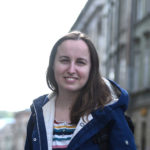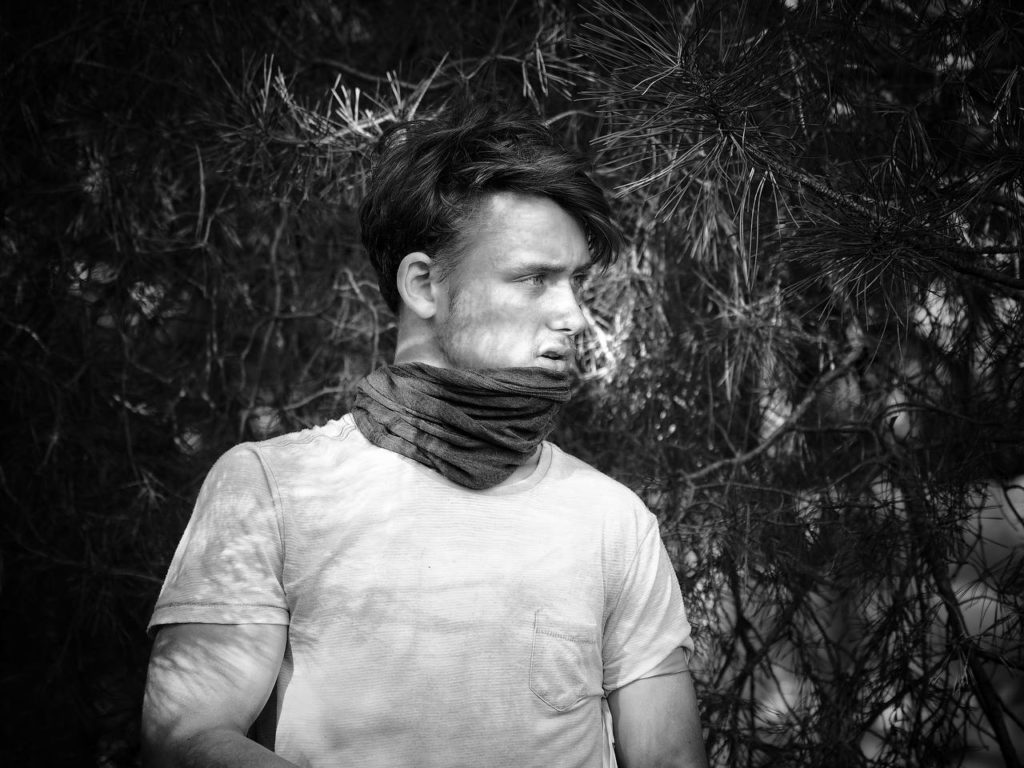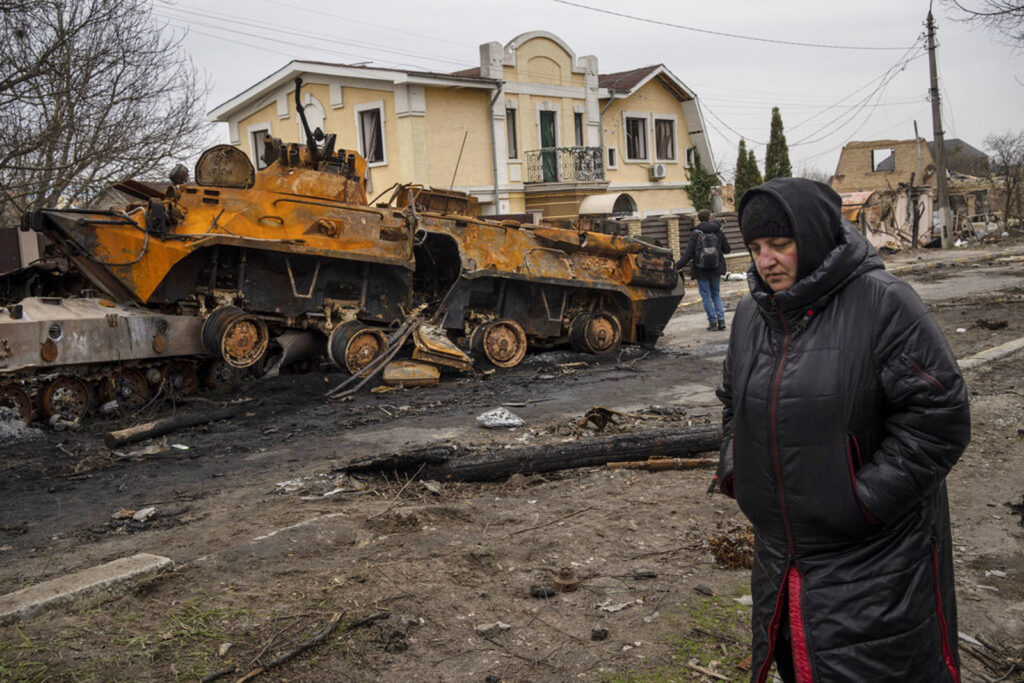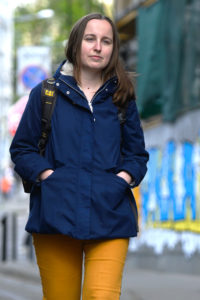
Olena Prokopchuk was in Kyiv when the Russian invasion of Ukraine started. She is now based in Lviv and works for a Ukrainian human rights organisation called “Right to Protection”. Her dad, sister and brother are still in Kyiv. With her once peaceful life now being torn apart by war, Olena writes about her hopes for peace and the reality of living a life she didn’t choose – like all people affected by the war in Ukraine.
— UPDATE —
Since her last blog was published, Olena’s friend and colleague, and environmental activist, Semen was killed defending Severodonetsk, a town in Eastern Ukraine, just 12 days after his wedding. His death is a reminder of the tragic and senseless loss of life due to the Russian aggression in Ukraine.

Olena would like to publish the following testimonial to Semen:
“Twelve days after his wedding, environmental activist turned soldier, Semen, was killed while defending Severodonetsk in the East of Ukraine.
Semen dreamt of becoming an arborist. At 22, he was already an environmental activist, a deputy military commander, a best friend, a comrade, a son, a brother and a husband.
I knew Semen as a colleague. He joined our small team in the environmental foundation, Peli can live, in the winter of 2021. After our first Zoom meeting, my colleague and I shared our impressions of him. Slightly naive. Very responsible. Open and honest. To put it diplomatically: he spoke frankly. His honesty and direct manner were well intentioned. Neither management nor his colleagues were ever offended by it.
We met in person only two or three times. During the pandemic, we worked remotely. I was living outside Kyiv, in the Zhytomyr region. Our meetings were wonderful, inspiring and joyful. We met to discuss the organization’s development strategy and priorities.”
“We talked, argued and laughed a lot. More than anything, I would like to live this day again.”
Then, in June 2022, Semen was killed while defending Severodonetsk, a town in Eastern Ukraine.
Leadership, dignity, selflessness, light, support to others, love for people and nature was all about you, Semen.
Just before his death, Semen gave an interview to the Ukrainian military journalist Yuriy Butusov, and also shared his sleeping bag with him. It was a usual thing for him – to share with others everything he had, to give his food or warm clothes, convincing everyone that he needed it the least.”
Semen died defending Severodonetsk at the age of 22. His body was brought to Kyiv, and his ashes were scattered by his relatives in Trakhtemirivskyi island.
It’s hard to let you go, Semen. You and thousands of others who, like you, while being so young, so brave, active, honest and open, took up arms. You, Roman Ratushny, Artem Dymyd and many others – you are forever in our hearts. In your young age, you have achieved so much! Semen, wherever you are now, may you be surrounded by the Zaporozhzhia steppes, the slopes of the Dnipro and the Carpathian mountains. Ukraine is standing, Ukraine is fighting.”
To read more about Semen in the words of his friends, colleagues and family, please click here.
— Оновлення —
З часу публікації останнього блогу Олени, її друг і колега, екологічний активіст Семен загинув, захищаючи Сєвєродонецьк, місто на сході України, всього через 12 днів після свого весілля. Його смерть є нагадуванням про трагічну і безглузду втрату життя внаслідок російської агресії в Україні.
Семен міг стати арбористом – мріяв про це. У свої 22 роки він уже був природоохоронцем, заступником командира роти (став ним лише за кілька місяців), а ще – найкращим другом, бойовим товаришем, сином, братом і чоловіком.
Я знала Семена як колегу: він приєднався до нашої маленької команди природоохоронного фонду «Peli can live» взимку 2021 року. Після першої ж спільної Zoom-зустрічі ми з колегою обмінялися враженнями й зійшлись на думці, що хлопець ок. Злегка наївний, дуже відповідальний, відкритий і чесний: те, що я намагалася загорнути в дипломатичну форму, він говорив відверто. Ось ця його чесність і прямота підкупали: ніхто – ні керівництво, ні колеги – на це ніколи не ображалися.
Ми зустрічалися наживо лише двічі чи тричі. Під час пандемії ми працювали дистанційно, до того ж я жила за Києвом, у Житомирській області. Проте це були чудові, натхненні й веселі зустрічі. Ми зустрілися, щоб обговорити стратегію розвитку організації та пріоритети нашої роботи. Ми багато говорили, сперечалися і сміялися. Більш за все я хотіла б пережити цей день знову.
У червні 2022 року Семен загинув, захищаючи Сєвєродонецьк, місто на сході України.
Лідерство, благородство, безкорисливість, підтримка інших, світло, любов до людей та природи – це все про тебе, Семен.
Напередодні загибелі Семен дав інтерв’ю українському військовому журналісту Юрію Бутусову, а ще поділився з ним своїм спальником. Для нього це було як зазвичай – поділитися з ближнім тим, що мав, віддати свою їжу чи теплий одяг, переконавши всіх, що йому це треба найменше.
…Семен загинув при захисті Сєвєродонецька у віці 22 років, його тіло вдалося привезти до Києва, його прах рідні розвіяли над Трахтемирівським півостровом. Буквально за 12 днів до загибелі Семен одружився.
Важко Тебе відпускати, Семене. Ти і тисячі таких, як Ти, які, ще будучи такими молодими, такими сміливими, активними, чесними і відкритими, взяли до рук зброю. Ти, Роман Ратушний, Артем Димид і багато інших – ви назавжди у наших серцях. За ваш юний вік ви змогли так непомірно багато!.. Семене, хай там, де Ти є зараз, Тебе оточують запорізькі степи, схили Дніпра і карпатські гори. Україна стоїть, Україна бореться.
Більше про Семена зі слів його друзів, колег та рідних можна прочитати за посиланням.
5 May 2022
I never intended to be a hero. At 32, I was thinking about other things. Being unhappy with office work. My next career move. Whether I’d ever be able to buy my own place. Wanting to get married and start a family. I never wanted to fear for my life, or count the number of explosions, or ask my friends if they were safe and sound, or read the news about the women raped just a few miles from my apartment. Least of all, did I want to be a hero.
Today in Ukraine, each of us is a hero. We get up in the morning and read the news. We message dozens of people during the day, just to make sure they’re alive. We work and volunteer. Each of us is a link among many others, ensuring that Ukraine stands strong against Russia.
I did not believe it would last this long. First, that we would be able to defend ourselves so strongly. And second, that it would take so much time. We want to go back to peace as soon as possible.
All I wanted to do in the first hours of Russian aggression was run and hide – and make sure I was no longer threatened. Back in January, my friends and I had decided that if the war started, we would leave the city together. Our plan was to go to Vorzel, a small town just next to Bucha, Irpin and Hostomel – the places where the Russian military have shown an inhuman level of cruelty and violence.
“All I wanted to do in the first hours of Russian aggression was run and hide. I was lucky to spend the first days of the war with someone who said it would be safer in a big city. She saved me from making any hasty mistakes.“
Instead, I stayed in Kyiv. I was lucky to spend the first days of the war with someone who knew where to find information about the safest place during the shelling. She balanced me emotionally and helped me get through the first shock of the war. She said it would be safer in a big city – and that saved me from making any hasty mistakes.
I spent the first twenty days of this new phase of the war in Kyiv. After that, I couldn’t take it any longer. It became clear from the damage that the missiles were flying right over my head — and it was only a matter of time or chance before they would hit my house. So we fled to Lviv. We spent four days travelling – me, my colleague and our three cats.
“It became clear from the damage that the missiles were flying right over my head — and it was only a matter of time or chance before they would hit my house.“

Today, in relatively safe and calm Lviv (though no place in Ukraine is truly safe now), I was drinking a coffee in a café. I was thinking how difficult it is to compare my life during peace (when I could just plan things, when I knew what to be ready for, when I could just go out into the street) with this new wartime experience (when I walk in the street and hear jet fighters overhead). It is very difficult to accept that this is the new reality of our lives. It is very difficult to make sense of it in your head. Everything is divided into before the war and after the war.
This war reality is taking more and more space within us. Only sometimes it breaks through: spring has begun, the apricot trees are blooming, the street I’m walking down has beautiful buildings, this food is very tasty, we are not talking about the war…
“It is very difficult to accept that this is the new reality of our lives. It is very difficult to make sense of it in your head. Everything is divided into before the war and after the war.“
Sometimes, when I work, I feel like crying. My colleagues are members of the local human rights organisation in Mariupol. They have not been in touch for about a month now. I ask myself if they are alive.
My father is staying in Kyiv, just like my sister and brother. Thank God, they have not been injured. I decided to go to Lviv knowing that they were staying in Kyiv. I suggested that we go all together – they refused, and I left. This is one of the decisions that each of us has to make during the war. I never intended to make decisions with consequences of this magnitude. I don’t want to think that I may just never see them again. If I could choose, of course I would rather not have this experience, not make these decisions or go through this ordeal.
“When it’s all over and we win, I will breathe a sigh of relief and I will say — yes, we’ve made it. Everyone fighting for freedom in Ukraine, and everyone who is supporting us from the outside.“
When it’s all over and we win, I will breathe a sigh of relief and I will say — yes, we’ve made it. Everyone fighting for freedom in Ukraine, and everyone who is supporting us from the outside. Everyone who publishes the truth about this war. We will all win, because we stand for the light and the truth. And I promise, we will all feel like heroes – because we already are.
For resources and ways on how you can help people in Ukraine, visit our page here.
Олена Прокопчук була в Києві, коли почалося вторгнення Росії в Україну. Зараз вона живе у Львові та працює в українській правозахисній організації «Право на захист». Її батько, сестра і брат досі в Києві. Її колись мирне життя тепер розірвано війною, і Олена пише про свої сподівання на мир і реалії життя, які вона не обирала – як і всі люди, що постраждали від війни в Україні.
Я не збиралася ставати геройкою. У 32 роки мої думки були зайняті іншим. Небажанням ходити в офіс. Розвитком кар’єри. Чи зможу я придбати своє власне житло. Бажанням створити свою родину і мати дітей. Менш за все я хотіла боятися за своє життя, рахувати кількість вибухів, запитувати друзів, чи вони цілі і неушкоджені та читати новини про зґвалтованих жінок буквально за десяток кілометрів від мого помешкання. Менш за все я хотіла бути геройкою.
Сьогодні в Україні кожен – герой. Ми вранці встаємо і читаємо новини. Ми надсилаємо повідомлення десяткам людей протягом дня, щоб переконатися, що вони живі. Ми працюємо і волонтеримо. Кожен і кожна з нас – ланка серед багатьох інших, яка забезпечує те, що Україна міцно протистоїть Росії.
Я не вірила, що це триватиме так довго. По-перше, що ми зможемо так потужно захищатися. По-друге, що це затягнеться аж настільки. Хочеться якомога швидше повернутися до мирного часу.
Все, що я хотіла зробити у перші години російської агресії – тікати і ховатися – зробити так, щоб мені це більше не загрожувало. Ще у січні я домовилася з подругами, що на випадок, якщо війна почнеться, ми разом виїдемо за місто. Ми планували поїхати у Ворзель, маленьке містечко поруч із Бучею, Ірпенем і Гостомелем – місцями, де російські військові проявили нелюдську жорстокість і насильство.
«Все, що я хотіла зробити у перші години російської агресії – тікати і ховатися. Мені пощастило провести перші дні війни з людиною, яка сказала, що у великому місті буде безпечніше. Вона вберегла мене від поспішних помилкових дій».
Натомість я залишилася у Києві. Мені пощастило провести перші дні війни з людиною, яка знала, де знайти інформацію про найбезпечніше місце під час обстрілу. Вона врівноважила мене емоційно і допомогла пережити перші потрясіння війни. Вона сказала, що у великому місті буде безпечніше – і це врятувало мене від поспішних помилкових дій.
Перші двадцять днів цієї нової фази війни я провела у Києві. Після цього я більше не могла це витримувати. З місць ушкоджень стало зрозуміло, що ракети летять прямо над моєю головою — і це було лише питанням часу або випадковості, коли вони поцілять у мій будинок. Тож ми поїхали до Львова. Ми провели чотири дні в дорозі – я, моя колега і три наші коти.
«З місць ушкоджень стало зрозуміло, що ракети літали прямо над моєю головою — і було лише питанням часу або випадковості, коли вони поцілять у мій будинок».

Сьогодні, у відносно безпечному та спокійному Львові (хоча зараз жодне місце в Україні не є по-справжньому безпечним) я пила каву в закладі. Я думала про те, що мені важко порівнювати своє життя у мирний час (коли можна було планувати, коли я знала, до чого бути готовою, коли навіть просто виходиш на вулицю) з цим новим досвідом війни (коли я виходила на вулицю і чула винищувачі у себе над головою). Дуже складно прийняти це як нову реальність нашого життя. Важко звести докупи у своїй голові. Усе ділиться на «до війни» і «після війни».
І ця реальність, воєнна, все більше захоплює простір усередині нас. І лише часом пробивається: весна почалася, розквітають абрикоси, я іду вулицями з красивими будівлями, їжа дуже смачна, ми говоримо не про війну…
Дуже складно прийняти це як нову реальність нашого життя. Важко звести докупи у своїй голові. Усе ділиться на «до війни» і «після війни».
Іноді мені хочеться плакати, коли я працюю. Мої колеги – працівники локальної правозахисної організації – досі в Маріуполі. З ними вже близько місяця немає зв’язку. Я запитую себе, чи вони живі.
Мій батько залишається у Києві, так само як сестра і брат. Слава Богу, вони не постраждали. Я прийняла рішення їхати до Львова, вже знаючи, що вони залишаються у Києві. Я запропонував поїхати всім разом – вони відмовилися, а я поїхала. Це одне з тих рішень, які кожен з нас вимушений приймати у час війни. Я ніколи не планувала приймати рішення з такою високою ступінню відповідальності. Мені не хочеться думати, що я можу їх ніколи більше не побачити. Якби я могла обирати – звісно, я би обрала не проходити через цей досвід, не бути вимушеною приймати такі рішення і не проходити через ці випробування.
«Коли все закінчиться і ми переможемо, я видихну з полегшенням і скажу — так, ми змогли. Усі, хто бореться за свободу в Україні, і всі, хто підтримує нас ззовні».
Коли все закінчиться і ми переможемо, я видихну з полегшенням і скажу — так, ми змогли. Усі, хто бореться за свободу в Україні, і всі, хто підтримує нас ззовні. Усі, хто публікує правду про цю війну. Ми всі переможемо, бо ми за світло і правду. І я обіцяю, ми всі будемо почуватися героями – бо ми вже ними є.
